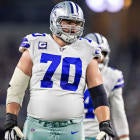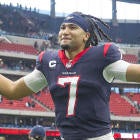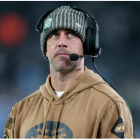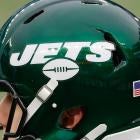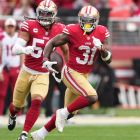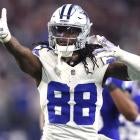The importance of the backup quarterback position in the NFL shouldn't be understated. Without Teddy Bridgewater a season ago, the Saints' season might've collapsed when Drew Brees missed five starts with a thumb injury. With Bridgewater, the Saints went 5-0 and eventually, won the NFC South. Without Matt Moore a season ago, the Chiefs might've lost too much ground in the playoff seeding when Patrick Mahomes missed nearly three full games with a knee injury. With Moore, the Chiefs went 2-1 in those three games and eventually, captured the second seed in the AFC. Without Nick Foles a few years back, the Eagles wouldn't have won the Super Bowl with Carson Wentz on the sidelines.
Backup quarterbacks matter, and their limited availability makes them matter all the more. There aren't even 32 starting-caliber quarterbacks in the NFL, which means most teams aren't able to roster a starting-caliber backup quarterback. There's only a lucky few. The rest of the lot is usually forced to ride out the season with a veteran who has an understanding of the league and system, but lacks the attributes to execute the offense at a high-enough level, or a young quarterback who has never really played in the NFL, which is why most teams can't survive the loss of their starting quarterback.
With all that in mind, now that most of the quarterbacks in free agency have been signed with the notable exception of Cam Newton, we decided now would be an appropriate time to rank all 32 teams based on their backup quarterback situations. First, a couple notes:
- Only the immediate backup was considered. The third-string quarterback on each and every team, for those that are carrying more than two quarterbacks, were not factored into the rankings. Neither were the starting quarterbacks. We're only looking at the second quarterback on the depth chart.
- In the event where the lines between a team's starter and backup are blurred (looking at you, Chicago), I did my best to make a judgement call on who I think will be the team's backup come Week 1 (looking at you, Trubisky).
- When it comes to highly drafted rookies, like Tua Tagovailoa, Jordan Love, Justin Herbert, and Jalen Hurts, their long-term value to their respective teams was given additional weight. They might not be as good of a backup right now as some established veterans, but the fact that they have the potential to morph into something more gave them added value whereas we already know established veterans like Brian Hoyer and Chase Daniel are solid backups at their absolute best.
Onto the list.
32. Seahawks' Anthony Gordon
Russell Wilson's durability has made the Seahawks' backup quarterback position irrelevant over the years. He's never missed a game in his career. The Seahawks better hope Wilson stays healthy again in 2020 because as it stands, it will be Gordon, an undrafted free agent from Washington State, who takes over. Don't expect him to be another Gardner Minshew. As NFL.com's Lance Zierlein wrote on his pre-draft profile of Gordon, "Gordon lacks Minshew's field awareness and decisiveness in reading coverages. He throws with touch but doesn't have the arm strength or eye discipline to keep NFL coverages from closing his throwing windows." The Seahawks are one of those teams that would make a ton of sense for Cam Newton in a backup role.
The Pick Six Podcast gang fired up a new episode breaking down every eye-catching aspect of the NFL's schedule release. Give it a listen below, and be sure to subscribe on your favorite podcast platform:
31. Rams' John Wolford
For the Rams' sake, Jared Goff better rebound after a difficult 2019 season and stay healthy, because the options behind him are limited. Who is John Wolford? He played collegiately at Wake Forest, where he threw for 29 touchdowns and only six interceptions in 2017. He entered the NFL as an undrafted free agent who signed with the Jets. He started for the Arizona Hotshots in the short-lived AAF. And he's been with the Rams ever since. He's yet to play in an NFL game.
30. Titans' Logan Woodside
The seventh-round pick of the Bengals two years ago still hasn't thrown a pass in the NFL. At Toledo, he posted gaudy numbers, but as noted in his pre-draft profile over at NFL.com, his lack of size and elite arm strength should hamper his ability to thrive in the NFL if he ever gets the chance. Woodside will battle for the backup job with seventh-round rookie Cole McDonald. If it's McDonald who wins the job, don't expect the Titans' ranking to change much. There's a reason he was taken in the seventh round: He's a developmental prospect lacking a lot of the traits shared by NFL-caliber quarterbacks. In short, there's not that much of a tangible difference between the two. They're both unproven with clear limitations.
29. Vikings' Sean Mannion
After starting for 12 seasons at Oregon State, Mannion has made a nice career for himself as a backup. In five seasons, he's started only two games with 13 total appearances, during which he's averaging 5.2 yards per attempt and a 57.5 passer rating. OK, I lied: Mannion only started at Oregon State for four seasons and while he's made a career for himself as a backup, I wouldn't exactly call it "nice."
28. Cardinals' Brett Hundley
Hundley has just never developed into the kind of quarterback many thought he could become when he was at UCLA. The fifth-round pick of the Packers now finds himself in Arizona, where he'll support Kyler Murray. If Hundley is thrust into action, the Cardinals are likely doomed. He's thrown four more interceptions than touchdowns in his career (13-9), has averaged 5.6 yards per attempt, and owns a 67.6 passer rating.
27. Jets' David Fales
Adam Gase certainly has a thing for Fales. The pair first teamed up in Chicago, again in Miami, and now in New York, where Fales will once again fit in behind Sam Darnold. What's remarkable is that in six professional seasons, Fales has only attempted 48 passes. His numbers aren't at all impressive (6.0 yards per attempt and a 79.1 passer rating), but with that small of a sample size, it's hard to know just how bad or just how good he is. But being around for six seasons and only getting a chance to throw the ball 48 times does not exactly bode well for Fales or the Jets if he is forced to step in under center during the upcoming season.
26. Bills' Matt Barkley
My favorite Matt Barkley fun fact is that he once wore a wetsuit under his uniform as a member of the Bears to stave off the cold. He actually played halfway decent football in that game too considering his lack of experience as an NFL starting quarterback and the fact that he was wearing a wetsuit under his uniform during a real live NFL game. Unfortunately, I don't have many more great things to say about Barkley as an NFL quarterback. There's a reason he's a backup; he carries a career 65.7 passer rating. It wouldn't be entirely surprising to see rookie Jake Fromm usurp him at some point during the upcoming season. In fact, I flirted with the idea of ranking Fromm here instead of Barkley.
25. Jaguars' Joshua Dobbs
Dobbs spent part of his offseason working at NASA. He majored in aerospace engineering at the University of Tennessee. I bring this up because Dobbs appears to have a very bright future after football. As for his future in football, it's still unclear. He's only thrown 12 passes in his entire career. That makes him better than the options listed before him. We know they're bad quarterbacks. We suspect Dobbs isn't good, but we don't know for certain.
24. Panthers' Will Grier
It's too early to write off Grier entirely. He's only started two games as a third-round rookie a year ago. But the early results are not promising. In those two starts, Grier went 28 of 52 (53.8 percent) for 228 yards (4.4 YPA), no touchdowns, four interceptions, and a 33.2 passer rating. Thank you, next.
23. Bengals' Ryan Finley
Finley was given a chance to succeed Andy Dalton a year ago as a fourth-round rookie, but flopped so hard that the Bengals reinserted Dalton into the starting lineup. With only 5.4 yards per attempt and a 62.1 passer rating in three starts, it's not difficult to understand how he lost the starting job so quickly. Still, given he's only entering Year 2, let's not completely write off his ability to become a competent backup to Joe Burrow.
22. Buccaneers' Blaine Gabbert
The 10th-overall pick in the 2011 draft has not seen his career go as planned, but at least he's made a living out of being a backup. The problem is, even as a backup, he's seldom found success. We all know he was a disaster as the Jaguars' starter from 2011-13, but since then as a backup for the 49ers, Cardinals, and Titans, he's completed 59.4 percent of his passes, averaged 6.5 yards per attempt, and thrown 26 touchdowns and 23 picks for a passer rating of 77.5. That makes him pretty similar to most backup quarterbacks.
21. Broncos' Jeff Driskel
It's telling that every person on the planet with Kenny Golladay on their Fantasy team rejoiced when Driskel was replaced by David Blough for the Lions' Thanksgiving game against the Bears last season. In Driskel, the Broncos are getting a quarterback who, filling in for Matthew Stafford a year ago, went 0-3 as the Lions' starter, threw an equal number of touchdowns and interceptions (4), averaged 6.5 yards per attempt, and finished with a 75.3 passer rating.
20. Texans' AJ McCarron
During the 2018 season, McCarron was Derek Carr's backup in Oakland. He arrived just before the season began via trade. When he was asked about the potential of him needing to actually play for the team, he accidentally gave us the perfect slogan for his NFL career.
"God forbid I get in there" -- the AJ McCarron story. https://t.co/KX579CqwDW
— Sean Wagner-McGough (@seanjwagner) September 6, 2018
All jokes aside, nobody is under the impression that McCarron is a starting-caliber quarterback. In his six-year career, McCarron is completing 62.4 percent of his passes, averaging 6.7 yards per attempt, sports a 6-3 TD-INT ratio, and has an 86.2 passer rating. In his one playoff start, filling in for Andy Dalton, he went 23 of 41 for 212 yards (5.2 YPA), one touchdown, one pick, and a 68.3 passer rating. God forbid he get in there, indeed.
19. Giants' Colt McCoy
A third-round pick of the Browns in 2010, McCoy has developed into a decent backup quarterback. The problem is, when looking at his numbers, his career stats are weighed down by his first two years in the league, when he was a starter on a terrible Browns team. In those two seasons, McCoy was truly awful, completing 58.4 percent of his passes, averaging 6.3 yards per attempt, throwing equally as many interceptions as touchdowns (20), and posting a 74.5 passer rating. He went 6-15 as a starting quarterback. But in the years since, when he transitioned to a more permanent backup role, he's found his footing, completing 67.2 percent of his passes, averaging 7.4 yards per attempt, throwing nine touchdowns and seven picks, and posting an 89.5 passer rating. Nobody will confuse him for a starter. But he's a decent backup given the other options out there across the league.
18. Redskins' Kyle Allen
I'll never understand why the Redskins felt the need to trade a fifth-round pick for a backup quarterback. The Redskins are not a backup quarterback away from being taken seriously as playoff team. A fifth-round pick, which at least has the potential to morph into a long-term asset, would've had far more value to the Redskins. Alas, they now have a backup quarterback behind Dwayne Haskins. In Allen, the Redskins are at least getting a backup quarterback with starting experience after he filled in for Cam Newton a year ago. But Allen wasn't any good in his 12 starts with the Panthers. Despite throwing seven touchdowns and zero interceptions in his first four starts, Allen wound up throwing 17 touchdowns and 16 interceptions by the time the season ended. He accomplished that by throwing 16 interceptions in his final nine games of the season. And that's why he's a backup, not a starting, quarterback.
17. Ravens' Robert Griffin III
The former Rookie of the Year isn't what he used to be, but he's a good fit for the Ravens' offense. Since his awesome rookie season back in 2012, he's completing 61.9 percent of his passes, averaging 7.0 yards per attempt, and has thrown the same number of touchdowns as interceptions (23), but he's experienced and has enough mobility to run the same style of offense as Jackson (albeit at a much slower and less electric pace). He's what teams are often looking for in their backup.
16. Falcons' Matt Schaub
In 2019, Schaub started one game for the Falcons. They didn't win, losing 27-20 to the Seahawks, but Schaub managed to throw for 460 yards in the process. He has a history of playing good football as a starter, though we haven't seen that version of him in nearly 10 years. Still, teams could do far worse than Schaub at the backup position.
15. Steelers' Mason Rudolph
When Rudolph got his chance to usurp Ben Roethlisberger this past season, it didn't go as planned. While the Steelers went 5-3 with Rudolph as their starting quarterback, their success was almost entirely about their defense. In 2019, Rudolph completed 62.2 percent of his passes, averaged 6.2 yards per attempt, and threw 13 touchdowns and nine interceptions for an 82.0 passer rating. For a backup quarterback, those numbers are fairly pedestrian. For a starting quarterback, those numbers are horrific. Luckily for the Steelers, he's their backup.
14. Lions' Chase Daniel
According to Spotrac, Daniel has earned $34.3 million during his 11 seasons in the NFL. In those 11 seasons, he's started five games. Daniel has made a pretty nice living as a backup quarterback. Over the past two seasons as Mitchell Trubisky's backup in Chicago, he completed 70 percent of his passes, averaged 6.8 yards per attempt, threw six touchdowns and four interceptions, and generated a 91.1 passer rating -- good numbers for a backup. But he has clear physical limitations, which prevented him from sneaking into the top 10.
13. Patriots' Brian Hoyer
It's no mystery what Hoyer, 34, is at this point in his career. Over the past 11 seasons, he's completing 59.1 percent of his passes, averaging 7.0 yards per attempt, has thrown 52 touchdowns and 34 interceptions, and has generated an 82.5 passer rating. Despite those pedestrian numbers, he's managed to garner starting opportunities for quarterback-needy teams (at the time) like the the Cardinals, Browns, Texans, Bears, 49ers, and Colts. He didn't stick in any of those places -- and with good reason: He's not a starting quarterback. He's a decent backup for the Patriots, though. He's familiar with their offensive system. But if he's asked to play significant minutes, he'll struggle. Knowing the system can only matter so much. Being able to execute the system at a high level by consistently making NFL-level throws matters more. Hoyer hasn't really ever been able to do that at any point in his lengthy career.
12. 49ers' Nick Mullens
In 2018, Mullens started eight games for a bad 49ers team. In those eight games, the 49ers went 3-5. Mullens completed 64.2 percent of his passes, averaged 8.3 yards per attempt, threw for 13 touchdowns and 10 interceptions, and posted a 90.8 passer rating. He did all of that as a second-year player who entered the NFL as an undrafted free agent. That's impressive -- impressive enough that if he's forced to fill in for Jimmy Garoppolo during the upcoming season, I'd be confident enough in Mullens (and Kyle Shanahan, of course) to keep the 49ers afloat.
11. Chiefs' Chad Henne
This is less about Henne and more about Andy Reid. A year ago, Matt Moore wasn't playing football until Henne suffered an injury in August and the Chiefs were forced to find a new backup on the eve of the season. Despite being out of football until August, Moore helped the Chiefs survive Patrick Mahomes' knee injury by completing 65.6 percent of his passes, averaging 7.3 yards per attempt, throwing four touchdowns and no interceptions, and posting a 102 passer rating in three games. Henne isn't more talented than the other quarterbacks listed before him, but he has the league's best offensive coach on his side. That's why he's ranked this high. He's good enough to do what Moore did a year ago.
10. Bears' Mitchell Trubisky
Trubisky is not a good NFL starting quarterback. But if he loses the quarterback competition to Nick Foles, which is obviously the assumption I'm making by listing him here instead of Foles, he'll immediately become one of the better backup quarterbacks. The last three years suggest he's a low-end starting quarterback -- this past season, he ranked 27th in DVOA -- but again, that would make him a great backup. He's mobile, can use his athleticism to manufacture yards outside the structure of the play, and is capable of playing good football over short stretches. It's when he's ask to play every week that he runs into clear issues as his limitations come into focus. But as a backup, that won't be an issue.
9. Chargers' Justin Herbert
Perhaps this is unfair to Herbert, the third quarterback taken in the 2020 draft behind only Joe Burrow and Tua Tagovailoa. Perhaps he should rank above Love and Hurts. But I wasn't convinced by what he put on tape at Oregon over the past four seasons. Unlike Love and Hurts, Herbert doesn't really have the "he just needs time to develop" excuse that those other two rookies have. We haven't really seen Herbert play at a truly exceptional level yet. I'm skeptical we ever will. Still, given his upside, he snuck his way inside the top 10. At least he still has potential. Most of the quarterbacks on this list don't have upside. Herbert, in theory, does. That's why he's ranked this high.
8. Eagles' Jalen Hurts
As a second-round rookie, Hurts is both an unknown and a bit of a project, but he also holds tremendous upside. I'd rather have an unknown project with upside than most of the backup quarterbacks listed before him, because we already know most of those quarterbacks aren't any good -- that's why they're backups. Hurts, on the other hand, at least has the potential to develop into something more. Add in the fact that he's playing for a coach that is known for getting the most out of his backup quarterbacks, and that's why the Eagles are ranked this high. Coaching matters.
7. Packers' Jordan Love
The Packers' decision to take Love in the first round when they had so many more urgent needs can be called into question, but at the very least, they did upgrade at backup quarterback going from Tim Boyle to Love. Again, there's a very strong argument to be made that the Packers should've been trying to help Aaron Rodgers win right now instead of upgrading at backup quarterback, but this isn't the space to do so. All that we know is that Love has the potential to become a long-term starter in the league. His talents were on display at Utah State in 2018, when he averaged 8.6 yards per attempt while tossing 32 touchdowns and only six interceptions. But his shortcomings were also on display the following season, when his yards per attempt dropped to 7.2 and he threw 20 touchdowns and 17 interceptions. Still, he carries upside -- enough upside to land inside the top 10. His long-term value vaulted him this high.
6. Browns' Case Keenum
By now, we all know about Keenum's limitations as a quarterback. But we also know he's made the most of his limited physical skillset to become a fringe starter who, in the right situation, can play good football. We saw it as recently as 2017, when filling in for Sam Bradford, he went 11-3 as the Vikings' starter while throwing for 3,547 yards, 22 touchdowns, seven interceptions, and a 98.3 passer rating. Nobody should expect a repeat in Cleveland should Baker Mayfield suffer an injury. But Keenum is capable and proven enough to play competent football on a stacked offense in Cleveland.
5. Colts' Jacoby Brissett
Brissett probably isn't a starting-caliber quarterback. In his career, he's completed just under 60 percent of his passes, averaged only 6.6 yards per attempt, owns a 31-13 TD-INT ratio, and has accumulated an 84.6 passer rating. But those are great numbers for a backup. A year ago, the Colts went 7-8 with Brissett at quarterback. They were right to aim higher by signing Philip Rivers, but Brissett gives them a solid insurance policy behind Rivers.
4. Raiders' Marcus Mariota
It's admittedly been a while since Mariota has performed like a starting-caliber quarterback. His last legitimately good season was way back in 2016. Even still, looking at his career numbers, it's clear he's one of the better backup quarterbacks and that he has a legitimate chance to eventually overtake Derek Carr on the Raiders' depth chart. In fact, it wouldn't be surprising if Mariota does that even before the season begins, although with the truncated offseason, Carr is a far better bet to begin the season as the starter. For his career, Mariota is sporting a 62.9 completion percentage, averages 7.5 yards per attempt, has thrown 76 touchdowns and 44 interceptions, and has generated an 89.6 passer rating. The biggest question with Mariota remains his health.
3. Dolphins' Tua Tagovailoa
I was tempted to rank Tagovailoa even higher, but the concerns over his health are legitimate. Still, he's the rare backup quarterback who has the clear potential to develop into a franchise savior. That's why the Dolphins took him at No. 5 in the 2020 NFL Draft. Before suffering a hip injury, Tagovailoa was the top quarterback prospect in his draft class. If he's healthy, he has a chance to be franchise changer. Obviously, since he's a rookie, ranking him this high requires a ton of projection and optimism, but I buy into his upside.
2. Cowboys' Andy Dalton
What a signing Dalton was by the Cowboys. They just made the biggest upgrade at backup quarterback in the entire NFL, going from Cooper Rush to a quarterback in Dalton who ranks ninth in passing yards, 10th in touchdown passes, and eighth in quarterback wins since he entered the league way back in 2011. Dalton wasn't any good in 2019 -- he was even bad enough to get benched for Finley for a brief stretch -- but he didn't get much help from a bad offensive line and receiving group lacking A.J. Green. In Dallas, Dalton will get to play with the best receiver trio in football, a top-five running back, and a top-five offensive line. Furthermore, Dalton is only two seasons removed from playing competent football. In 2018, he ranked 17th in both DVOA, which measures value per play, and total QBR. He's often been a quarterback who can succeed so long as he has help around him. In Dallas, he'll get exactly that. If Dak Prescott misses any time, whether it's due to his contract situation or an injury, the Cowboys will be well equipped to survive his absence with Dalton.
1. Saints' Jameis Winston
Yes, Winston led the league with 30 interceptions, seven of which were returned for a defensive touchdown. But he also threw for 5,109 yards and 33 touchdowns. If Drew Brees were to go down with an injury and miss a few weeks, as he did in 2019, the Saints would have confidence that Winston would be able to keep them afloat. After all, he's capable of getting smoldering hot for a few weeks at a time. It happens every season.
What vaulted the Saints with Winston over the Cowboys with Dalton is that Winston is more than just a good short-term backup quarterback. He also gives the Saints a potential long-term option as they look to transition successfully away from the Brees era. Winston is still only 26 years old. He needs to cut the turnovers, but learning from both Sean Payton and Brees can only help. Winston is both a great backup quarterback and a potential long-term starting quarterback, whereas Dalton, at the age of 32, is only a short-term backup.
Plus, he can see now. That could matter.











